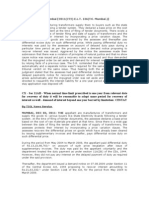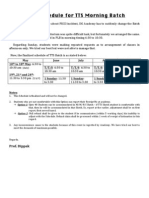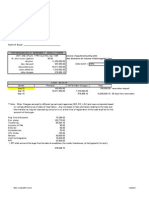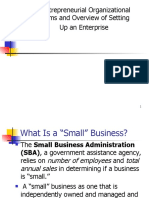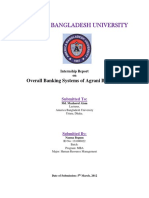Central Excise: Grasim Industries Ltd. - 2011 - SC
Central Excise: Grasim Industries Ltd. - 2011 - SC
Uploaded by
swami_ratanCopyright:
Available Formats
Central Excise: Grasim Industries Ltd. - 2011 - SC
Central Excise: Grasim Industries Ltd. - 2011 - SC
Uploaded by
swami_ratanOriginal Description:
Original Title
Copyright
Available Formats
Share this document
Did you find this document useful?
Is this content inappropriate?
Report this DocumentCopyright:
Available Formats
Central Excise: Grasim Industries Ltd. - 2011 - SC
Central Excise: Grasim Industries Ltd. - 2011 - SC
Uploaded by
swami_ratanCopyright:
Available Formats
ICAI- Select Cases for Nov, 2012 Attempt
Important Cases and Gist Thereof/ Prof Dippak
CENTRAL EXCISE
GRASIM INDUSTRIES LTD. - 2011 -SC
Whether the metal scrap or waste generated during the repair of his worn out machineries/parts of cement manufacturing plant by a cement manufacturer amounts to manufacture? Iron scrap cannot be said to be a by-product of the final product. At the best, it is the product of the repairing process. ED can be demanded only on such waste/scrap which arises out of manufacturing process/activity.
GTC INDUSTRIES LTD. -2011 -BOM. HC
A roll of aluminum foil was cut horizontally to make separate pieces of he foil and world PULL was embossed on it. Thereafter fixed number cigarettes were wrapped in it. Aluminum foil, being a resistant to moisture, was used as a protector for the cigarettes and to keep them dry. Does the process of cutting and embossing aluminium foil for packing the cigarette amount to manufacture? Prior to 2012- HC held that Cutting and embossing did not transform aluminium foil into distinct and identifiable commodity and thus, this activity is not manufacture. But post 2012, this activity has been made deemed manufacture [FA, 2012]
MARUTI SUZUKI INDIA LTD. - 2010 -TRI. Larger Bench
The appellants were manufacturers of various types of MOTOR VEHICLES. Department observed that while selling the vehicles to the customers, the dealers added their own margin known as the dealers margin to the price at which the vehicles were made available to them by the appellants. This dealers margin contained provision for rendering predelivery inspection and three after sale services. Hence, the Department contended that the cost of post delivery inspection and after sale services were to form part of the assessable value of the automobile while discharging the duty liability. Whether the charges towards pre-delivery inspection and after-sale-service recovered by dealers from buyers of the cars would be included in the assessable value of cars? The charges towards Pre-Delivery Inspection (PDI) and After-Sale-Service recovered by dealers from buyers of the cars would be included in the assessable value of cars.
[Tutorial Note: Provisioning of these is primarily responsibility of Manufacturer, who has shifted it to dealer by increasing their margin. This was attempt of tax evasion.]
ICAI- Select Cases for Nov, 2012 Attempt
Important Cases and Gist Thereof/ Prof Dippak
TATA ADVANCED MATERIALS LTD. -2011 -KAR. HC
The assessee claimed the CENVAT credit on the duty paid on capital goods which were later destroyed by fire. The Insurance Company reimbursed the amount inclusive of excise duty. Is the CENVAT credit availed by the assessee required to be reversed? Judgment is of no relevant at present. [So decision not printed] Presently, this situation is covered by Rule 3(5-A) of CCR, 2004 which provides for removal of capital goods after use, whether as capital goods or as waste/scrap. The amount equal to higher of following 2 is payable [a] Amount = Reduced CCr (calculated by applying prescribed % of reduction for each quarter of use) [b] Amount= ED leviable on TV
ECOF INDUSTRIES PVT. LTD. -2011 -KAR.
Head office distributed the cenvat credit of the service tax paid on the services received to its various units. Can the CENVAT credit be denied to a particular unit on the ground that input services were obtained by another unit belonging to the same manufacturer? Judgment is of no relevant at present. [So decision not printed] Presently, Rule 7 of CCR, 2004 provides that credit of service used exclusively in one unit shall be distributed to that unit only.
ICON INDUSTRIES - 2011 -(DEL.)
[Expected]
The petitioner got its units registered after few days of the search conducted in its units. Thereafter, it filed consolidated return with the Department for the period prior to search. After that, it filed a settlement application in respect of the proceedings issued by the Commissioner. The Settlement Commission opined that the units were registered only after the search was conducted and prior to that there was no registration and no returns as mandated by clause (a) of first proviso to section 32E(1) of the Central Excise Act, 1944 were filed. Consequently, the Commission rejected the settlement application on the ground that the application did not conform to the parameters as stipulated under section 32E(1) of the Act. In case of consolidated returns filed in the instant case, the applicant would not be able to indicate duty paid in the prescribed manner (or even in any manner) and question would continue to agitate about the details of production and clearance to be filled in such belated returns. Whether a consolidated return filed by the assessee after obtaining registration, but for the period prior to obtaining registration, could be treated as a return under section 32E(1) [clause (a) of first proviso]? Filing of consolidated return covering all the past periods would not serve the purpose. Rejection of Settlement Application is proper.
ICAI- Select Cases for Nov, 2012 Attempt
Important Cases and Gist Thereof/ Prof Dippak
CUSTOMS
POONA HEALTH SERVICES - 2009 - (BOM.)
bound to pay the customs duty? The appellant contended that once the imported goods were confiscated under section 125 of the Customs act, 1982, and the option to release them was not exercised, no duty was payable. He placed reliance on section 23 which provides that if the owner of imported goods relinquishes his title to the goods, he shall not be liable to pay the duty thereon. The High Court elucidated the distinction between section 23 and section 125. Under section 23, the person who imports the goods, surrenders his title in the goods. By surrendering title in the goods, the person importing the goods or the owner of the goods ceases to have a right to claim the goods. On the other hand, the order of confiscation is passed in respect of the person who has claimed to import or export the goods. It implies that he claims title or right in the property. The fine under section 125 is payable by the person who seeks redemption of the goods. If the goods are not redeemed, then they vest in the State. The person however, who had imported the goods, does not cease to have liability for payment of duty because he continues to be the person who had imported the goods and claims title of the goods. In case the imported goods are confiscated, and goods are not redeemed by paying fine, the importer is bound to pay the customs duty.
[Tutorial Note: Sec 125 provides for release of goods on payment of redemption fine. It provides that in case imported opted for release of goods on payment of redemption fine, then he shall be liable to pay import duty additionally. Sec 125 does not speak about the situation where importer decides not to redeem the goods. Assessee has tried to argue (drawing analogy from Sec 125) that in that case, he shall not be liable to import duty (particualarly because he ceases to be owner in that case). However, HC has held importer will remain liable to import duty which has been attracted on account of act of importation. Further, HC has held that decision of non-redemption does not amount to relinquishment of title (and accordingly, he cannot save import duty liability under section 23)]
[Expected]
In case the imported goods are confiscated, and goods are not redeemed by paying fine, whether the importer is
SERVICE TAX
CHERTHALA MUNICIPALITY - 2011 - (KER.)
[Expected] RTP Question
Appellant has entered into rental-agreements with the Municipality and had taken rooms on rent from it. Under the agreement, there was no provision for payment of service tax. They were called upon to pay service tax by the service provider (Muncipality) despite the agreement being silent as to payment of service tax by the service recipient to the service provider.
ICAI- Select Cases for Nov, 2012 Attempt
Important Cases and Gist Thereof/ Prof Dippak
Appellant argued that in absence of any provision as to payment of ST in rental agreement, the demand for payment of service tax by service provider was illegal. [Appellant further argued that service tax was payable by the Municipality (service provider) and there was no authority with which the Municipality could pass it on to it]. In case where service agreement is silent as to levy/recovery of ST on rooms rent, can it pass the burden of service tax to the service receivers i.e. tenants? As regards the contention that there was no mention of the service tax liability in the contract, the Court held that this is a statutory right of the service provider/Municipality by virtue of the provisions under law to pass it on to the tenants. It is another matter that they may decide not to pass it on fully or partly. It is not open to the appellant to challenge the validity of the demand for service tax, in view of the fact that service tax is an indirect tax and the law provides that it can be passed on to the beneficiary. Hence, the service tax can be passed on by the service provider i.e. Municipality. Hence, it was held that Municipality can pass on the burden of service tax to the tenants.
[Tutorial Note: Very pragmatic and rational decision favourable to Service provider. Many times, service contracts are entered into when service is non-taxable, hence contract does not contain any clause as to payment of Service tax. When such service is made taxable (for first time), then, if ST is not recovered from service recipient, then its burden will fall on the service provider (which can jeopardise the profit line of service provider). This case has upheld that in case service provider is not ready to absorb this burden, then he has right to recover service tax amount from service recipient in court of law]
You might also like
- Sample Questions 5-6Document8 pagesSample Questions 5-6jangrapa100% (1)
- 59 - Service Tax JudgmentsDocument18 pages59 - Service Tax JudgmentsAbhishek MehtaNo ratings yet
- Silkair (Singapore) Pte, Ltd. V. Commissioner of INTERNAL REVENUE. G.R. No. 173594. February 6, 2008Document20 pagesSilkair (Singapore) Pte, Ltd. V. Commissioner of INTERNAL REVENUE. G.R. No. 173594. February 6, 2008Dawn BarondaNo ratings yet
- TaxationDocument55 pagesTaxationorlandoNo ratings yet
- Common TopicsDocument51 pagesCommon Topicsjonnajon92No ratings yet
- Important Case Lawsin Indirect Tax Lawsfor May 2011 ExamsDocument10 pagesImportant Case Lawsin Indirect Tax Lawsfor May 2011 ExamsmyforzaNo ratings yet
- Cir vs. Isabela Cultural Corporation (Icc) : Issue/SDocument5 pagesCir vs. Isabela Cultural Corporation (Icc) : Issue/SMary AnneNo ratings yet
- 2020 10 13 2012 24 Taxmann Com 323 Gujarat 31 08 2012 Vodafone Essar Gujarat LTD Vs DepartmentDocument24 pages2020 10 13 2012 24 Taxmann Com 323 Gujarat 31 08 2012 Vodafone Essar Gujarat LTD Vs Departmentpoojasinghai0207No ratings yet
- Central Excise Laws Cases Compilation 2009Document5 pagesCentral Excise Laws Cases Compilation 2009Phani KiranNo ratings yet
- Case Studies in TDS: 294, The 1961 Act Is An Integrated CodeDocument10 pagesCase Studies in TDS: 294, The 1961 Act Is An Integrated CodeGitanjali ShindeNo ratings yet
- Amendment Booklet GST CA CMA CS Inter MAY 2023 ExamsDocument57 pagesAmendment Booklet GST CA CMA CS Inter MAY 2023 ExamsPRATHAM AGGARWALNo ratings yet
- 52 Recent Judgements STDocument131 pages52 Recent Judgements STvudatalj123No ratings yet
- Case ResearchDocument4 pagesCase ResearchLim pei LimNo ratings yet
- Judicial Snippets: /idt /service TaxDocument4 pagesJudicial Snippets: /idt /service Taxswami_ratanNo ratings yet
- Taxation: CIR Vs Achi Forging CompanyDocument2 pagesTaxation: CIR Vs Achi Forging CompanygailacdNo ratings yet
- Important Case Law Under Customs - CA Final Nov 20Document20 pagesImportant Case Law Under Customs - CA Final Nov 20Deepsikha maitiNo ratings yet
- Before The Authority For Advance Rulings (Income Tax), New DelhiDocument16 pagesBefore The Authority For Advance Rulings (Income Tax), New DelhiShreyas ShahNo ratings yet
- A.M. Khanwilkar and Dinesh Maheshwari, Jj. Civil Appeal No. 7865 of 2009 JULY 29, 2020Document46 pagesA.M. Khanwilkar and Dinesh Maheshwari, Jj. Civil Appeal No. 7865 of 2009 JULY 29, 2020Deeptangshu KarNo ratings yet
- Understanding GST Part 14 CG Input Input ServicesDocument4 pagesUnderstanding GST Part 14 CG Input Input ServicesrgramachandranNo ratings yet
- Iidt RTP Cases Nov 2015Document36 pagesIidt RTP Cases Nov 2015jesurajajosephNo ratings yet
- Bax Global India LTD Vs Commissioner of Service Tax, ... On 18 September, 2017Document10 pagesBax Global India LTD Vs Commissioner of Service Tax, ... On 18 September, 2017KumarvNo ratings yet
- CA Final IDT Amendments For May 2016Document11 pagesCA Final IDT Amendments For May 2016Venugopal RNo ratings yet
- Consumer Protection Act 2019 - ServicesDocument37 pagesConsumer Protection Act 2019 - Services125117059No ratings yet
- Chapter 118Document26 pagesChapter 118Nitin SrivastavaNo ratings yet
- 25-11-2020 Case Studies On RefundsDocument8 pages25-11-2020 Case Studies On Refundsdalip.singhNo ratings yet
- G.R. No. 111474, August 22, 1994Document6 pagesG.R. No. 111474, August 22, 1994Lawrence NgNo ratings yet
- Practical Illustrations On Indirect TaxationDocument9 pagesPractical Illustrations On Indirect Taxationsridharan1969No ratings yet
- Case LawDocument21 pagesCase LawRam SskNo ratings yet
- Service Tax On Freight GtaDocument8 pagesService Tax On Freight GtaVinodKaulNo ratings yet
- P. Madhavi Devi, Member (J) and B. Ramakotaiah, Member (A)Document14 pagesP. Madhavi Devi, Member (J) and B. Ramakotaiah, Member (A)Amitesh TejaswiNo ratings yet
- 2022 141 Taxmann Com 223 New Delhi CESTAT 18 02 2022Document30 pages2022 141 Taxmann Com 223 New Delhi CESTAT 18 02 2022pradeepkumarsnairNo ratings yet
- Q&A On FIDIC Orange BookDocument10 pagesQ&A On FIDIC Orange BookHiwotNo ratings yet
- EC - 07 - Webel - IT Park - Haldia - AMC - Fire - 2020-21 - 026Document16 pagesEC - 07 - Webel - IT Park - Haldia - AMC - Fire - 2020-21 - 026personalphone01052023.1No ratings yet
- Chapter 8_20240831Document26 pagesChapter 8_20240831Amit MantryNo ratings yet
- CIT V InsilcoDocument13 pagesCIT V InsilcoRavi SrinivasanNo ratings yet
- My Comments Are Given BelowDocument4 pagesMy Comments Are Given Belowpdkprabhath_66619207No ratings yet
- Villanueva V City of IloiloDocument48 pagesVillanueva V City of Iloiloamun dinNo ratings yet
- Service Tax On Works ContractDocument37 pagesService Tax On Works ContractSandesh MundraNo ratings yet
- Case Digest TaxDocument4 pagesCase Digest Taxroxanne.suriyaoNo ratings yet
- VAT Theory Question Answer by Subash NepalDocument13 pagesVAT Theory Question Answer by Subash Nepalssah4155No ratings yet
- Tax Digests CorreaDocument4 pagesTax Digests CorreaRed PamatmatNo ratings yet
- Judicial Snippets: /idt /customsDocument4 pagesJudicial Snippets: /idt /customsdev_glaNo ratings yet
- Service Tax AssignmentDocument9 pagesService Tax AssignmentRahat AdenwallaNo ratings yet
- (GST) 01 Class NotesDocument21 pages(GST) 01 Class Notessohamumbarkar03No ratings yet
- Customs, Excise & Service Tax Appellate Tribunal West Zonal Bench at AhmedabadDocument7 pagesCustoms, Excise & Service Tax Appellate Tribunal West Zonal Bench at AhmedabadcustomsrraahmedabadNo ratings yet
- PJ CL Ultra Tech Cement LTDDocument2 pagesPJ CL Ultra Tech Cement LTDAjaydosi DosiNo ratings yet
- Goods & Services Tax CasesDocument209 pagesGoods & Services Tax CasesGurpreet SinghNo ratings yet
- Taxguru - In-Gujarat High Court Decision On The Demerger Scheme Between Vodafone Essar Group CompaniesDocument31 pagesTaxguru - In-Gujarat High Court Decision On The Demerger Scheme Between Vodafone Essar Group CompaniesMudit KediaNo ratings yet
- Salvador - Kepco-Ilijan Corporation v. CirDocument19 pagesSalvador - Kepco-Ilijan Corporation v. CirAntonio Dominic SalvadorNo ratings yet
- Tax Assignment Question 3Document5 pagesTax Assignment Question 3Rick WaveyNo ratings yet
- Hamm LessaDocument92 pagesHamm LessaSayed MohamedNo ratings yet
- 3M India - MF Case Law - Bang ITATDocument16 pages3M India - MF Case Law - Bang ITATbharath289No ratings yet
- Mitsubishi Motors Philippines Corporatio vs. Bureau of Customs G.R. No. 209830 June 17, 2015 FactsDocument1 pageMitsubishi Motors Philippines Corporatio vs. Bureau of Customs G.R. No. 209830 June 17, 2015 FactsMilcah MagpantayNo ratings yet
- RARBGDocument9 pagesRARBGAndrea IvanneNo ratings yet
- Demand of Interest Beyond One Year Barred by Limitation - CESTATDocument6 pagesDemand of Interest Beyond One Year Barred by Limitation - CESTATGanesh AnantharamNo ratings yet
- 2024 06 13 2024 159 Taxmann Com 685 AAAR WEST BENGAL 2024 103 GST 575 AAAR WEST BENGAL 2024Document4 pages2024 06 13 2024 159 Taxmann Com 685 AAAR WEST BENGAL 2024 103 GST 575 AAAR WEST BENGAL 2024Amit MantryNo ratings yet
- Tom Digest AcleoDocument15 pagesTom Digest AcleoGuilgamesh EmpireNo ratings yet
- Cit Vs Tei Technologies Pvt. LTD On 27 August, 2012Document18 pagesCit Vs Tei Technologies Pvt. LTD On 27 August, 2012chandravadan_patilNo ratings yet
- CIR v. Aichi ForgingDocument5 pagesCIR v. Aichi Forgingamareia yapNo ratings yet
- An Overview of Compulsory Strata Management Law in NSW: Michael Pobi, Pobi LawyersFrom EverandAn Overview of Compulsory Strata Management Law in NSW: Michael Pobi, Pobi LawyersNo ratings yet
- Sez-Latest Write Up (E/N 17/2011) : Operations Are Free From Tax Burden?Document6 pagesSez-Latest Write Up (E/N 17/2011) : Operations Are Free From Tax Burden?swami_ratanNo ratings yet
- Large Taxpayer Unit (Ltu) : Concept ofDocument3 pagesLarge Taxpayer Unit (Ltu) : Concept ofswami_ratanNo ratings yet
- Scanner DG Uplaod - c91Document7 pagesScanner DG Uplaod - c91amandp83No ratings yet
- Final Schedule For TTS Morning BatchDocument1 pageFinal Schedule For TTS Morning Batchswami_ratanNo ratings yet
- 2 Forward Rate AgreementDocument8 pages2 Forward Rate AgreementRicha Gupta100% (1)
- Judicial Snippets: /idt /central ExciseDocument14 pagesJudicial Snippets: /idt /central Exciseswami_ratanNo ratings yet
- Sec. 3-A: Special Manner of Collection of Excise DutyDocument8 pagesSec. 3-A: Special Manner of Collection of Excise Dutyswami_ratanNo ratings yet
- Judicial Snippets: /idt /service TaxDocument4 pagesJudicial Snippets: /idt /service Taxswami_ratanNo ratings yet
- Rules of Interpretation: Rule of LITERAL INTERPRETATION (Golden Rule of Interpretation)Document5 pagesRules of Interpretation: Rule of LITERAL INTERPRETATION (Golden Rule of Interpretation)swami_ratanNo ratings yet
- IandF CT1 201604 ExaminersReport WithMarksDocument14 pagesIandF CT1 201604 ExaminersReport WithMarksMaryam YusufNo ratings yet
- Compunding Machine PortfolioDocument1 pageCompunding Machine PortfolioManmohan ToshniwalNo ratings yet
- FM Handout 4Document33 pagesFM Handout 4Rofiq VedcNo ratings yet
- 13 Marginal CostingDocument5 pages13 Marginal CostingPriyanka ShewaleNo ratings yet
- Digest - Salinas v. Tuason and RomanDocument2 pagesDigest - Salinas v. Tuason and RomanAleli Guinto0% (1)
- In 2001, BSP Issued The Manual of Regulations For Banks (Morb) - Provided in Morb Was Section 338 Which StatesDocument2 pagesIn 2001, BSP Issued The Manual of Regulations For Banks (Morb) - Provided in Morb Was Section 338 Which StatesRamon Khalil Erum IVNo ratings yet
- Accounting ConceptDocument1 pageAccounting ConceptFajar WahyudiNo ratings yet
- Other Percentage TaxDocument3 pagesOther Percentage TaxBon BonsNo ratings yet
- July Net Profit Improved: FlashnoteDocument5 pagesJuly Net Profit Improved: FlashnoteSergio FibonacciNo ratings yet
- Midterm Mock Exam Questionnaire (With Answers)Document15 pagesMidterm Mock Exam Questionnaire (With Answers)Ella Mae Magbato100% (1)
- Hindalco 2014 PDFDocument211 pagesHindalco 2014 PDFAbhimanyu GuptaNo ratings yet
- Natco AR 2018 PDFDocument103 pagesNatco AR 2018 PDFAkashNo ratings yet
- HDFC BillDocument1 pageHDFC Billpadmanabharaju pakalapatiNo ratings yet
- The Residences at Greenbelt Manila Tower 1-Bedroom For Sale 24DDocument2 pagesThe Residences at Greenbelt Manila Tower 1-Bedroom For Sale 24DJP ReyesNo ratings yet
- BHARATH SfinalDocument66 pagesBHARATH Sfinalaurorashiva1No ratings yet
- Research HHHDocument1 pageResearch HHHmei168zhenNo ratings yet
- Nvs Brokerage Pvt. LTD.: 702, Embassy Centre, Nariman Point, Mumbai - 400 021. Tel.: 61539100 Fax: 61539134 E MailDocument3 pagesNvs Brokerage Pvt. LTD.: 702, Embassy Centre, Nariman Point, Mumbai - 400 021. Tel.: 61539100 Fax: 61539134 E MailMLastTryNo ratings yet
- Kerala Land Reforms Act Bhoopariskarana Niyamam Ceiling Procedures Uploaded by T James Joseph AdhikarathilDocument17 pagesKerala Land Reforms Act Bhoopariskarana Niyamam Ceiling Procedures Uploaded by T James Joseph AdhikarathilJames Adhikaram100% (1)
- Subclass - 600 Online Application Checklist Philippines: Visitor Visa - Tourist StreamDocument2 pagesSubclass - 600 Online Application Checklist Philippines: Visitor Visa - Tourist StreamStephanie Ann LopezNo ratings yet
- Directory of FilesDocument14 pagesDirectory of FileshananNo ratings yet
- DTP Kalapata Distry PDFDocument250 pagesDTP Kalapata Distry PDFExecutive EngineerNo ratings yet
- Entrepreneurial Organizational Forms and Overview of Setting Up An EnterpriseDocument30 pagesEntrepreneurial Organizational Forms and Overview of Setting Up An Enterprisesonam_kansalNo ratings yet
- B Com Semester 6 Auditing and Assurance Multiple Choice QuestionsDocument113 pagesB Com Semester 6 Auditing and Assurance Multiple Choice QuestionsBhavesh DhandeNo ratings yet
- Central Bank of India: Iv Part D - Rental Rates For Safe Deposit Locker Dimensions Volume in Cu - CmsDocument2 pagesCentral Bank of India: Iv Part D - Rental Rates For Safe Deposit Locker Dimensions Volume in Cu - CmsAnkur SharmaNo ratings yet
- Tax Calculator A y 2006 07 To 2011 12Document8 pagesTax Calculator A y 2006 07 To 2011 12Bhaskar Kumar ShawNo ratings yet
- Review-ASM1-Nguyen Thi Cam TienDocument12 pagesReview-ASM1-Nguyen Thi Cam TienNguyen Thi Cam Tien (FPI HCM)No ratings yet
- Chapter 14 Titman 1SlidePages Cost of CapitalDocument54 pagesChapter 14 Titman 1SlidePages Cost of Capitallor nandezNo ratings yet
- Vodafone Indi1Document14 pagesVodafone Indi1kalaswamiNo ratings yet
- Agrani First PartDocument5 pagesAgrani First Partmd. Piar AhamedNo ratings yet






















































